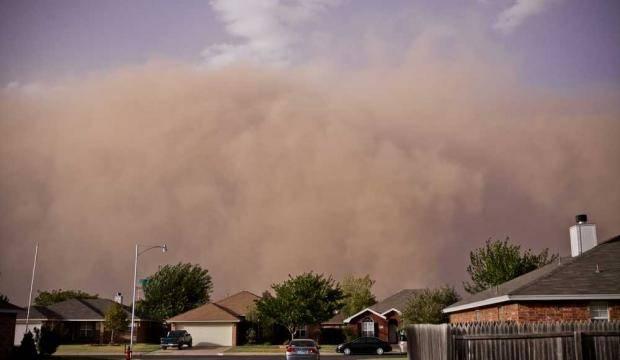Potential Haboob Lung Syndrome Concern
It might be beneficial to cover your face or stay indoors the next time there’s blowing dust outside.
Dr. Ragesh Panikkath, a physician and fellow in cardiology at the Texas Tech University Health Sciences Center, said not doing so could put you at risk for developing something he calls “Haboob Lung Syndrome.”

Panikkath said the haboob that hit Lubbock in 2011 created some lung issues for four otherwise-healthy people he later observed for a study regarding the effects of the dust storm on the lungs. Each one spent some time exposed to the storm.
Dust-associated breathing issues are not new, he said. Breathing issues are often reported around the Middle East where haboobs are more common and several similar cases were reported during the Dust Bowl.
Kenneth Nugent, chief of pulmonary and critical care at the HSC, said the disturbance created in the lungs seems to cause an inflammatory reaction similar to an infection, but it’s not.
“Lungs can be overwhelmed with intense dust exposure,” he said. But that type of reaction to intense exposure is not limited to dust particles.
Any abnormal particle will create a disturbance, he said.
The patient cases cited in Panikkath’s paper published in The American Journal of Medicine in 2013 reported identical symptoms - a cough and shortness of breath.
During medical observation, each patient had low oxygen levels.
A healthy oxygen level is generally between 95 to 100 percent, Panikkath said. Three patients presented with oxygen saturation levels in the 70s. One had saturation levels in the 80s.
Patient X-ray images of the lungs are cloudy.
Each patient was tested and questioned extensively, Panikkath said.
“There were no prior conditions,” he said.
None of the patients were smokers, none had lung issues and none had previous health issues. Throat cultures came back clear and doctors ruled out several probable causes, including asthma and allergies, Panikkath said.
After receiving oxygen, the patients’ oxygen levels improved but some still didn’t reach healthy levels. With the oxygen provided, they should have, he said.
One patient observed in the study died, he said.
“Treatment is not clear,” Panikkath said.
With recent weather patterns, Panikkath said he wants to inform Lubbockites about Haboob Lung Syndrome.
Nugent said it’s vital to protect your lungs.
“If you see dust, you probably should be out of it,” he said.
Related Stories
Celebrating Veterans: TTUHSC’s General Martin Clay’s Legacy of Service and Leadership
From his initial enlistment in the Army National Guard 36 years ago to his leadership in military and civilian health care management roles, Major General Martin Clay’s career has been shaped by adaptability, mission focus and service to others.
Texas Tech University Health Sciences Center School of Nursing Named Best Accelerated Bachelor of Science in Nursing Program in Texas
The TTUHSC School of Nursing Accelerated Bachelor of Science in Nursing (BSN) program has been ranked the No. 1 accelerated nursing program in Texas by RegisteredNursing.org.
TTUHSC Names New Regional Dean for the School of Nursing
Louise Rice, DNP, RN, has been named regional dean of the TTUHSC School of Nursing on the Amarillo campus.
Recent Stories
The John Wayne Cancer Foundation Surgical Oncology Fellowship Program at Texas Tech University Health Sciences Center Announced
TTUHSC is collaborating with the John Wayne Cancer Foundation and has established the Big Cure Endowment, which supports the university’s efforts to reduce cancer incidence and increase survivability of people in rural and underserved areas.
TTUHSC Receives $1 Million Gift from Amarillo National Bank to Expand and Enhance Pediatric Care in the Panhandle
TTUHSC School of Medicine leaders accepted a $1 million philanthropic gift from Amarillo National Bank on Tuesday (Feb. 10), marking a transformational investment in pediatric care for the Texas Panhandle.
Texas Tech University Health Sciences Center Permian Basin Announces Pediatric Residency Program Gift
TTUHSC Permian Basin, along with the Permian Strategic Partnership and the Scharbauer Foundation, Feb. 5 announced a gift that will fund a new pediatric residency.
